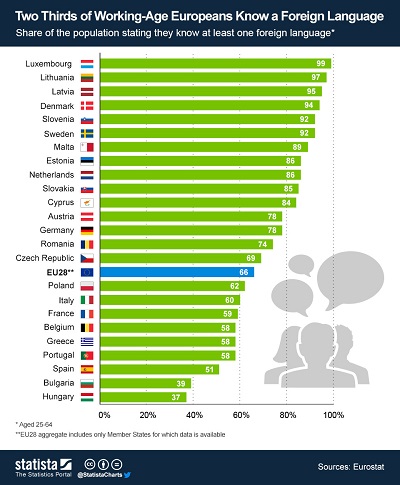
In 2011 Luxembourg boasted a population in which 99% could speak a second language; today researchers say that bilinguals may benefit in more ways than previously thought due to their grasp of two or more languages.
At one time, being fluent in two or more languages was not perceived as the advantage many see it as today. In fact, according to Penn State, many worried that it could affect bilinguals negatively in some way. Parents worried that exposing their children to two languages might slow down or impair the language learning time and ability of their child.
By contrast, researchers today think otherwise. Judith F. Kroll, Distinguished Professor of Psychology, Linguistics and Women's Studies at Penn State, commented that “recent studies reveal the remarkable ways in which bilingualism changes the brain networks that enable skilled cognition, support fluent language performance, and facilitate new learning.”
Kroll presented findings on how bilinguals learn and use language in ways that rewire their brains in February 2016 at the annual meeting of the American Association for the Advancement of Science in Washington, DC.
Several researchers who have spoken up on this topic have noted that bilinguals cannot easily ‘switch off’ one language but that both languages are active simultaneously. According to Penn State linguistic researchers, it does not matter whether the individual changed from one language to the other happened seconds ago or days ago, both languages will still be present in that person's mind.
Quartz and the World Economic Forum (WEF) have referred to the switching between languages as "mental gymnastics", describing bilinguals as “models of cognitive control”.
A Eurostat survey from 2011 showed that two thirds of working age adults in the EU knew at least one foreign language. Due to its trilingual education system and the proximity to other countries, the figures for Luxembourg showed that 99% of the population spoke at least one additional language in said survey. Although German and French are two of the three official languages in Luxembourg (the third being Luxembourgish) they are both counted as foreign languages for the purpose of education statistics.
Graph from Eurostat.








